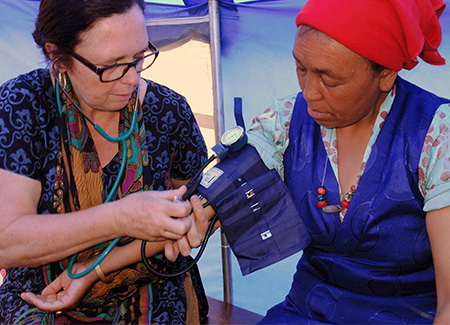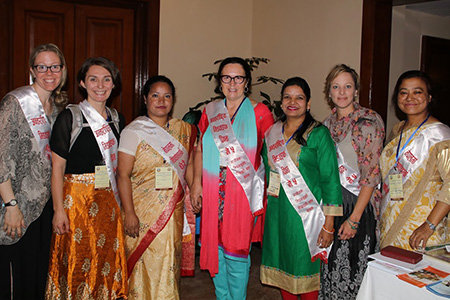Cathy Ellis, a senior instructor with UBC’s four-year Midwifery program, has devoted her career to improving maternal health in countries around the world, including Mexico, Kosovo, Zambia, Uganda and Nepal.
In 2005, she established UBC’s Students for Global Citizenship — an initiative that offers UBC midwifery students an opportunity to participate in global practicums in low-resource regions of the world.
We sat down with Ellis to find out more about what attracted her to a career in midwifery and learn more about the impact of UBC’s Students for Global Citizenship program.
Tell me about your history with global women’s health.

Cathy Ellis (left) provides care in a relief tent after the 2015 earthquake in Nepal.
I began learning midwifery in a three-bed rural Mexican health centre with Dr. Mickey Rostoker, a family physician, and a Mexican nurse named Magdalena. We attended about 12 births every month, both in the health centre and at women’s homes. In the small health centre, we were also called to attend breech and twin deliveries so I was able to get a wide variety of experiences as a young midwife as part of the health care team. We spent several years there and became a part of the community.
A few years later, Dr. Rostoker and I travelled to Nicaragua with our family (three young boys) and again worked in a busy health centre in a rural community. I also held monthly workshops to refresh the skills of individuals who worked in their communities helping women deliver their babies at home. I was on call for 15 days out of every month during those years, and we attended about one birth per day.
My early years as a midwife in rural low resource areas informed my studies and the work I do today. I am currently engaged in writing my dissertation for my doctorate in Health Sciences, Global Health at Simon Fraser University.
You established the UBC Students for Global Citizenship in 2005. What was the inspiration for starting this initiative?
I started the ‘Students for Global Citizenship’ (Global Midwifery Placement) together with Dr. Rostoker in order to create a formal educational venue to teach and inspire students who were interested in global maternal and infant health.
The program has developed from a short orientation and a six-week placement to a 3-credit theory and 9-credit, hands-on practicum in global maternal infant health. During the theory part, the students learn about how disparities affect heath status and birth outcomes. During the practicum, students travel abroad to have an opportunity to see first-hand the effects of how poverty affects maternal infant health outcomes and how culture, the status of women, distance and caregivers’ attitude affects the ability of mothers to receive good care at birth.
Ultimately, I hope to have student participants become more aware of the disparity between rich and poor and its effect on maternal infant health, and walk away inspired to work with disadvantaged communities here at home or abroad at some point in their career.
What has been the impact of the Citizens for Global Midwifery Program?

Cathy Ellis flanked by UBC midwifery students and Nepalese midwives at the Midwifery Society of Nepal (MIDSON) Conference in Kathmandu.
The impact of this program has been far-reaching, and I’m very lucky to be reminded of just how transformative the experience can be for our learners. Some students have told me that they return from their global placement with a commitment to continue working with communities that are trying to establish respectful midwifery care. Others have said that they feel stronger as a person, and more confident in their abilities to tackle personal obstacles in life. By taking part in the program, our students learn ways to work in low resource settings that will assist them at home deliveries or when working in rural and remote settings in Canada.
Since bi-lateral learning is a focus of the global placements, local midwives and physicians teach UBC students together with the UBC midwife and physician preceptors. Our UBC preceptors teach refresher courses for Ugandan midwives and intern doctors together with our partners, the Ugandan midwifery trainers. Students have a chance to share what they know as senior students in these midwifery workshops and with other Ugandan students.
Several of the midwives we have worked with in Uganda and Nepal have also become national trainers, and through their work, we have managed to reach hundreds of maternity care providers, updating their skills to save lives and improve quality of care to mothers.
Recall one of your most meaningful moments from your time working abroad with students.
We had just arrived to work in a rural hospital in Baglung, Nepal when the April 25, 2015 earthquake hit. The students I was with, who are now graduated, showed incredible strength and resilience as we set to attending mothers in childbirth, a day after the earthquake, on the temporary main floor triage area of the hospital. We attended childbirth behind a curtained room divider and in a small eye examination room. Our students, even under stress, showed their typical kindness and love to the mothers and families, helping to reassure them that they and their babies were safe. We gave out handmade blankets and hats from our knitters and sewers from BC, Ontario and Saskatchewan who send us baby items made with love for the mothers in Nepal and Uganda.
As an instructor, helping to train the next generation of midwives, what inspires you about the future of midwifery care in BC and globally?
I am inspired by the strength of people in BC and abroad who continue to struggle to make birth a safe and respectful experience for mothers. I am also very encouraged by those young midwives whom I have taught, and know that they will continue to work to make excellent midwifery care accessible to mothers at home and worldwide.
Cathy Ellis was featured by the Midwives Association of BC as Midwife of the Month for her role in advancing midwifery and maternity care globally.
